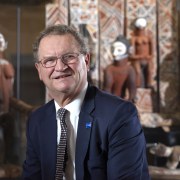Objects in Western natural history, botanical, and ethnological museums come from all over the world – this is how these institutions provide at least a glimpse of global (natural) history and biodiversity. But how did the objects arrived at these museums? Were specimens or paleontological finds taken in colonial contexts? What were the researchers' or explorers' relationships with local communities then, and what are they now? Do we cooperate with researchers or communities from these regions today? Do we talk about the origins of our collections? The answers to these questions send out political messages to our museum audiences.
In this session, we will argue that museums should take a clear position. Speakers from different institutions will give insight into their different projects, share lessons learned and discuss their work with session participants.



